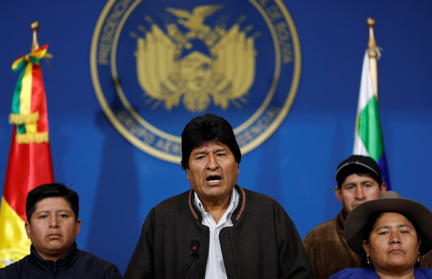
(above) President Evo Morales of Bolivia announced he would call a new vote in a televised address in El Alto, Bolivia, on Sunday. Credit...Carlos Garcia Rawlins/Reuters
Morales Pledges New Bolivia Election After International Audit
November 10, 2019 - Original article: New York Times
President Evo Morales had claimed victory in a recent vote, but monitors questioned the result.
By Anatoly Kurmanaev and Mónica Machicao
Faced with unrelenting protests over the results of disputed elections in which he claimed victory, President Evo Morales of Bolivia announced on Sunday that he would call new elections.
The announcement came hours after the Organization of American States released a preliminary report of its audit of the Oct. 20 vote.
The group, whose charter promotes democracy among member organizations in the Western Hemisphere, said that it would not certify Mr. Morales’s victory and that the results should be annulled because of widespread irregularities.
The company that provided vote-counting machines for the election had also disavowed the results.
Speaking in a televised address on Sunday, Mr. Morales, Bolivia’s first Indigenous leader, called for peace and said he would replace the Electoral Tribunal before holding a new vote in the South American country. He did not specify a date for the repeat election.
The tribunal was criticized by the opposition as excessively loyal to Mr. Morales and accused of widespread electoral fraud.
The new vote “will allow the Bolivian people to democratically elect their new leaders,” Mr. Morales said from his traditional stronghold in the city of El Alto, outside La Paz. “I want to ask everyone to lower all the tension.”
Mr. Morales pivoted on Sunday after his grip on power grew tenuous over the weekend, when police units in most of Bolivia’s major cities mutinied and joined antigovernment protesters. The military also distanced itself from the president, saying it would remain neutral in the political crisis.
Lacking the support of security forces, Mr. Morales, who came to power in 2006, declared, “A coup is underway,” and he called on his supporters to take to the streets to defend his government, raising fears of widespread partisan violence.
The unrest spread El Alto by Saturday night, and government supporters and protesters clashed on the streets, according to local news reports.
In the countryside, where Mr. Morales remains popular with poor farmers, government supporters blocked and attacked with stones several caravans of protesters heading to demonstrations in La Paz.
It was unclear if Mr. Morales’s accession to a new election would pacify the country. Some opposition leaders previously said that they would not accept a new vote with Mr. Morales as candidate.
They had accused the president of illegally changing the Constitution to allow him to run for an unprecedented fourth term.
The opposition also claimed the October vote was rigged.
The outcome of the vote has been in dispute since election officials released preliminary results that pointed to a runoff between Mr. Morales and Carlos Mesa, a former president.
The ballot count suddenly stopped. Election officials did not provide updates for nearly 24 hours, and gave no explanation.
When the election results were finally updated, officials reversed themselves and said Mr. Morales was leading by 10 percentage points, the margin required to avoid a runoff.
That announcement sent protesters into the streets. The demonstrations continued through Saturday, when tens of thousands of people rallied in Santa Cruz, demanding that Mr. Morales resign by Monday.